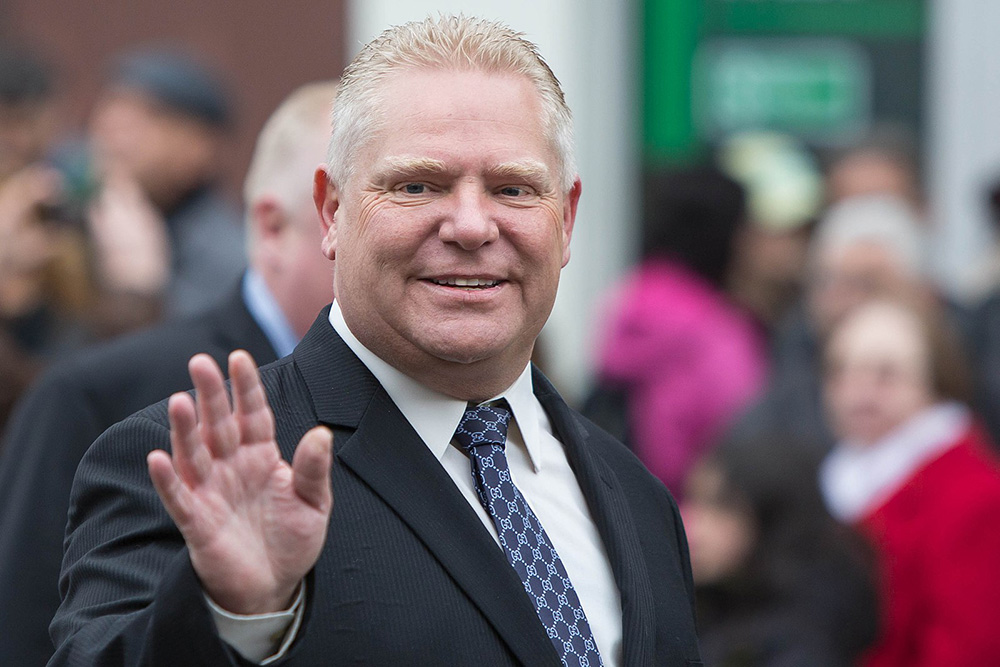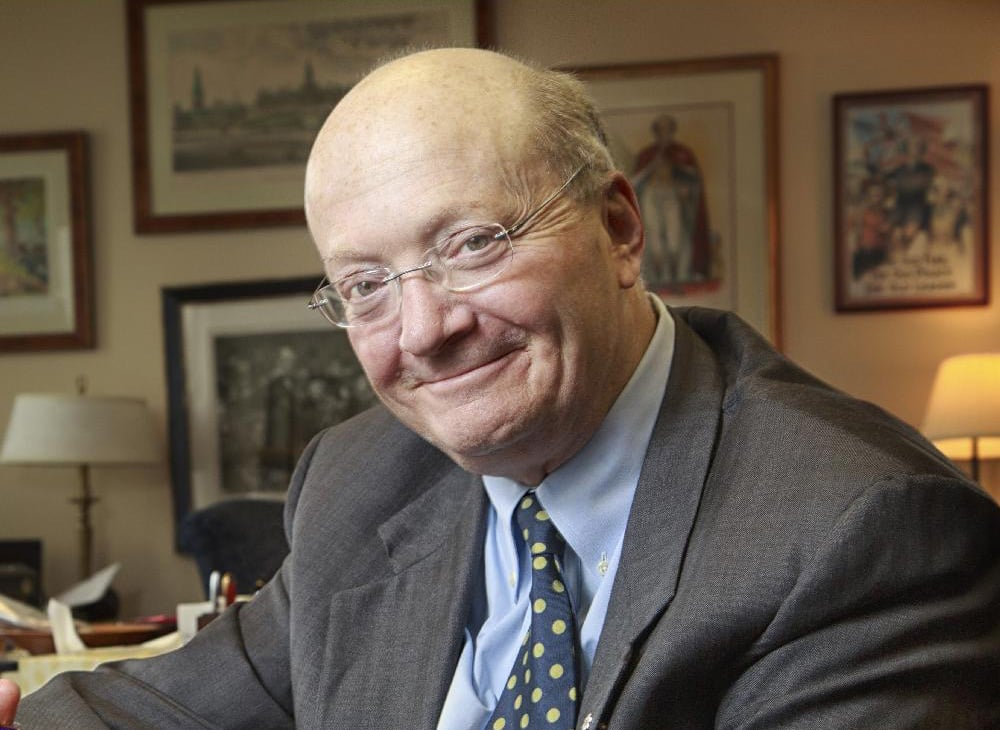Hugh Segal sees no contradiction in being a conservative who’s long advocated a way to deal with poverty that some call a radical form of wealth distribution.
And as tech disrupts and the gig economy makes jobs more precarious, his idea has been talked up by noted people of many ideological stripes. Barack Obama, Milton Friedman, Elon Musk, cabinet secretaries for Ronald Reagan or Bill Clinton, take your pick. All have endorsed, to some degree, a guaranteed basic income.
Segal can take satisfaction in not only advocating the policy early, but helping to craft a real-life pilot project in Ontario (shut down by the incoming Doug Ford government).
Now, after an election that signalled growing division in Canada, Segal suggests a guaranteed income could help build bridges.
“There are disagreements and there are strong differences in points of view, but the way you build national unity is by having national projects with which everybody can identify,” he told The Tyee. “Let’s be clear: 75 per cent of Canadians think a basic income would be a good step forward. And, there is an expert committee looking at a basic income in British Columbia.”
(The Tyee has made a two-minute video explainer: ‘What Is Universal Basic Income?’ Find it here.)
John Diefenbaker ignited Hugh Segal’s interest in politics, which led to him joining and eventually running for the legendary prime minister’s Progressive Conservative Party. But it was Joan Baez who inspired Segal — a Paul Martin-appointed Conservative senator from 2005 to 2014 — to consider the far-reaching implications of poverty.
As he recounts in his recently released book, Bootstraps Need Boots: One Tory’s Lonely Fight to End Poverty, published by UBC Press, Segal and a fellow high-school classmate landed an exclusive interview for their student magazine with the American folk-music icon in Montreal during her anti-Vietnam War concert tour in the early 1960s.
“The battle for civil rights and the battle against the war are really the same battle,” Baez told the teens in her suite at the Windsor Hotel. The draft caught up poor, mainly African-American and Hispanic young men denied the advantages their Caucasian counterparts had through university deferments or “parents well-connected enough to work the system,” Segal writes.
Baez’s linkage of war and human rights to poverty resonated with Segal, who grew up in a poor Eastern-European Jewish immigrant family in Montreal’s working-class west end. He never forgot where he came from as he rose up the ranks of Canada’s political establishment to serve as Brian Mulroney’s chief of staff and eventually as a parliamentarian, and advanced the need for a guaranteed annual income as the most effective way to alleviate poverty.
Now 69 and serving as both the Matthews Fellow in Global Public Policy at Queen’s University in his hometown of Kingston, Ont., and a senior advisor at Toronto law firm, Aird & Berlis LLP, Segal recently spoke to The Tyee about his book and the challenge of getting poverty on the agendas of parties and on the minds of parliamentarians.
Here is what he had to say...
On how a basic annual income would work:
“It would work the way the Guaranteed Income Supplement works for seniors. Everybody has to file their taxes. If you fall beneath a certain level, you’d be automatically topped up.
“The proposal that I made to the Province of Ontario was that rather than the present level of welfare, which is fairly rule-laden, massively over-administered, and forces the people who work in those departments to be auditors and police officers about how people are living as opposed to helping people out of poverty.
“Those welfare programs across Canada generally do not pay more than 50 per cent of what it takes to be at the poverty line or a little bit above.
“Moreover, all those programs have restrictions as to whether or not you’re allowed to work. If you did work while you’re on welfare, and depending on the province, money earned would be clawed back, becoming a huge disincentive to try to find a spot in the workforce.
“The recommendation I made was to take people from 45 per cent to 70 per cent of the poverty line, and increase the monthly benefit from $640 per individual to $1,300. Plus if they did find work, which they’d be encouraged to do, they would pay 50 per cent tax on half of what they earned but keep the rest. When they reached the same amount as the basic grant, they’d pay the same level of taxation as everybody else in the economy.”
On whether it would reward the lazy:
“Seventy-per-cent of Canadians who are beneath the poverty line have jobs. Some, in our big cities, have more than one, but can’t get above the poverty line because of the costs in their jurisdictions.
“So the notion that this is about people who sit on their couch, eat bonbons and watch soap operas is an ancient right-wing trope for which there is simply no justification.”
On why it’s not bizarre to imagine left and right working together on solving poverty:
“All the major social and economic improvements that have made a difference in people’s lives have really come from a multi-party source.
“[Co-operative Commonwealth Federation premier] Tommy Douglas in Saskatchewan started universal health insurance in the early 1960s. Mr. Diefenbaker, when he was prime minister, asked Mr. Justice Emmett Hall of the Supreme Court [of Canada] to study that for the country as a whole. When Justice Hall submitted his report, Mr. Diefenbaker had been defeated by Mr. [Lester] Pearson, a Liberal in a minority government, who worked with the provinces to bring in a system whereby we had universal health insurance across Canada.
“The first guaranteed annual income supplement started from the Progressive Conservatives in a minority government in Ontario in 1975. It started because in a standing committee on social affairs, the New Democrats and the Liberals made a motion to reduce the minister of Community and Social Services’ salary to one dollar because of the lack of engagement on seniors’ poverty. We had just been through an election campaign, and I was the legislative assistant to the premier [Bill Davis]. Rent control had come up in the campaign, but seniors’ poverty had not.
“I asked: why can’t we figure out what the issue is? When we did, the numbers were so clear; 35 per cent of seniors in Ontario who were mostly women were living below the poverty line. The province brought in the guaranteed annual income supplement and it had support across the legislature. It spread to a few other provinces, and then the federal government introduced the Guaranteed Income Supplement for seniors, which means that no Canadian resident, who is 65 and older, would live on less than $1,200 a month.
“These things become part of the universal consensus of what is fair and just in a mixed-market economy, and I think that’s the best way this poverty issue is going to be addressed.”
On whether he is a member of any political party:
“No, I’m not.”
On the chance afforded by Canada’s new minority Parliament:
“I am quite optimistic. I would say that probably the coalition most supportive of moving ahead on this file to begin with would be the Liberals, New Democrats and Greens. It’s been part of the Green platform for over 10 years.
“The Liberals also deserve credit for the child benefit which has lifted some 800,000 kids out of poverty across the country, and I can understand why having done that three or four years ago that they weren’t prepared to go the next step to a basic income for working-age people. But this is a new Parliament, and there’s a new mandate, so I think it’s a time of some opportunity.
“And who knows, the way in which it’s put forward, there may be some thoughtful Conservatives who are more than prepared to push within their party for a more rational and open-minded approach. But I don’t expect the leadership to be there on this as an issue.”
On why Prince Edward Island could offer the next test case:
“There is now a Red Tory Progressive Conservative government in minority elected in Prince Edward Island with the Greens as the official Opposition. There is a resolution that was passed by the legislature and articulated in the throne speech that there should be a basic income. A Special Committee on Poverty is meeting now on how to put that together, and I appeared before the committee to discuss what I had the privilege of doing in 2016 for [former Ontario Liberal] premier [Kathleen] Wynne in terms of the plan for a basic-income pilot, which was launched in 2017.
“I’m hoping that the new mix in Parliament will allow people who care about poverty in different parties to work together and try to establish a national basic-income pilot, which could be run in P.E.I., where about 22,000 residents out of about 157,000 people live beneath the poverty line.”
On who is ‘deadly opposed’:
“Here are the people who are deadly opposed to it: all the civil servants in every finance department across Canada. Why? Because when you have a program that says as the Guaranteed Income Supplement does for seniors that if you reach a certain age you have a statutory right. That means that money will be spent whether civil servants think it’s a good idea or not, every year. That reduces their control; that reduces their influence; and that reduces their ability to maintain the spending discretion of their minister.
“The other group opposed quite often is the far left: union organizers and others who are normally well-intentioned and whom I broadly tend to support. But on this issue, they’re afraid it will do away with public-service jobs in welfare departments across Canada, and it is their duty to protect the jobs of their members.
“They often talk about the need for programs that will deal with the implications of poverty, but they don’t like the idea of a direct-cash transfer.
“Of course the other group opposed is the far right that says if you pay people to do nothing they will do nothing, and argue that we can’t afford it, when in fact there’s no evidence to back that up.”
On whether it would be too expensive:
“[Ottawa member of Parliament] Pierre Poilievre, the Conservative finance critic, asked the Parliamentary Budget Officer what it would cost to take my proposal for the Ontario basic-income pilot and make it a national program. The answer was that initially it could cost about $76 billion, but before we would reduce the federal programs that it would replace. That would take it down to about $44 billion.
“But remember Ontario alone spends $10 billion on welfare and disability support. So if the basic-income program replaced that, there would be a further saving and you’d have savings of similar proportionality in every province.
“The notion that we would spend about $20 billion to reduce poverty and all the negative pathologies of it strikes me as a completely affordable and sustainable proposition.”

On poverty absent from debates in the recent federal election:
“We had three TV debates and it did not come up.
“The same thing happened in 2011 and I called Steve Paikin, who was the moderator of the English debate, and I said, ‘How come poverty didn’t come up?’ He said, ‘We did polling and people didn’t raise it as an issue,’ and I said, ‘Steve, the people who are living beneath the poverty line are in such a desperate, daily scramble to make sure there’s lunch for the kids, to make sure there’s money to pay for the heat or that they’re not behind in their rent that they don’t have time to do long polling surveys on the phone.’
“So the notion that they would leave that out was quite surprising.”
On whether he and Bernie Sanders, who calls for a ‘living wage,’ are on the same page:
“A living wage is really about, through contract-compliance, government saying to suppliers that they have to pay better than the minimum wage to their employees. I don’t disagree with that as an interesting way forward. But it is different from a statutory guarantee that no resident of Canada will fall beneath a certain basic amount that they need to live with some modest measure of dignity and self-respect.
“It’s not the same as the living wage. It’s complementary to it. But I think it’s a different approach in terms of the fundamental socioeconomic responsibility we have to our fellow citizens. I say this as someone who’s been a Progressive Conservative all my life.
“My brand of conservatism has always been about equality of opportunity. It’s been about inclusion and stability in the context of our parliamentary traditions. It’s not about necessarily having the state over-legislate; it’s not about neo-conservative selfishness with respect to constantly lowering taxes so the state loses the capacity to do what it should be doing, which has become part of the brand of the federal Conservative party — and conservatives in other parts of the world, to be fair.”
On Doug Ford, who killed the basic-income pilot program in Ontario just after taking office:
“He purports to be for the people, and I guess that doesn’t include low-income people. That’s not good enough. That’s not the kind of inclusive progressive conservatism that has always been, by and large, the brand in places like Ontario.”
On how a basic annual income helps the whole economy:
“It’s about providing liquidity for an economy overall.
“When I was in the Senate and part of the government caucus at the time, Canada Mortgage and Housing Corp. bought $362 billion worth of performing mortgages from the banks to keep them liquid during the collapse of the U.S. credit system in ′06, ′07 and ′08. That was the right thing for Mr. Harper to do.
“But if CMHC, which is owned by the Canadian taxpayer, has that capacity, how come we don’t have the ability to provide liquidity for individuals who fall beneath the poverty line — in many cases, for no fault of their own. It just doesn’t make any sense.”
On how a guaranteed income relates to climate change:
“What we know about climate change, natural disasters and serious and frightening weather [is that] low-income people pay the biggest price. They have the least level of resilience to fight back, to deal with what happens to their property or their part of the world. Therefore, the notion that we would tackle climate change, which we need to do as an absolute top priority without addressing poverty, makes no sense at all.
“All the pathologies that cost our society so much — early sickness and hospitalization; bad educational outcomes for kids; family violence; not doing well with the law, running into substance-abuse issues — are all driven by poverty.”
On why he wrote the book:
“The editor said, ‘We simply want the answer to one question: Why are you the most prominent conservative on the side of a basic income guarantee? How did that happen? What happened in your life?’ And I said, ‘Why would anyone care?’
“They made the case that if people understand how someone who identifies as a conservative who believes in things like a productive economic system and fair profits, but also believes in a basic income, and read how you came to that conclusion, that may broaden the base of people who are prepared to give some consideration to this means of reforming our welfare system.
“On that basis, I concluded that maybe I owed it to the thousands of people involved in the basic-income movement and people who are doing advocacy for low-income people across Canada, and that’s why I wrote the book.”
On whether he expects to ever see an end to poverty in Canada:
“If you’re a Red Tory, you are by definition optimistic. Some would say naive and delusional but I prefer to view it as optimistic.” ![]()
Read more: Rights + Justice, Politics
















Tyee Commenting Guidelines
Comments that violate guidelines risk being deleted, and violations may result in a temporary or permanent user ban. Maintain the spirit of good conversation to stay in the discussion.
*Please note The Tyee is not a forum for spreading misinformation about COVID-19, denying its existence or minimizing its risk to public health.
Do:
Do not: